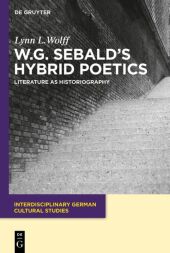 Neuerscheinungen 2016Stand: 2020-02-01 |
Schnellsuche
ISBN/Stichwort/Autor
|
Herderstraße 10
10625 Berlin
Tel.: 030 315 714 16
Fax 030 315 714 14
info@buchspektrum.de |

Lynn L. Wolff
W.G. Sebaldīs Hybrid Poetics
Literature as Historiography
2016. XII, 297 S. 230 mm
Verlag/Jahr: DE GRUYTER 2016
ISBN: 3-11-048599-0 (3110485990)
Neue ISBN: 978-3-11-048599-8 (9783110485998)
Preis und Lieferzeit: Bitte klicken
The series publishes monographs and edited volumes that showcase significant scholarly work at the various intersections that currently motivate interdisciplinary inquiry in German cultural studies. Topics span German-speaking lands and cultures from the 18th to the 21st century, with a special focus on demonstrating how various disciplines and new theoretical and methodological paradigms work across disciplinary boundaries to create knowledge and add to critical understanding in German studies. The series editor is a renowned professor of German studies in the United States who penned one of the foundational texts for understanding what interdisciplinary German cultural studies can be. All works are peer-reviewed and in English. Three new titles will be published annually. About the series editor: Irene Kacandes is the Dartmouth Professor of German Studies and Comparative Literature at Dartmouth College, Hanover, New Hampshire. She received three degrees from Harvard University and also studied at the Free University of Berlin and Aristotle University in Thessaloniki, Greece. She publishes on a wide range of interdisciplinary topics including secondary orality, rhetoric, aesthetics, trauma, witnessing, family and generational memory, experimental life writing, Holocaust testimony, and narrative theory. She has lectured widely in the United States and Europe and currently serves as President of the International Society for the Study of Narrative and Vice President of the German Studies Association.
The series publishes monographs and edited volumes that showcase significant scholarly work at the various intersections that currently motivate interdisciplinary inquiry in German cultural studies. Topics span all periods of German and German-speaking lands and cultures from the local to the global, with a special focus on demonstrating how various disciplines - history, musicology, art history, anthropology, religious studies, media studies, political theory, literary and cultural studies, among others - and new theoretical and methodological paradigms work across disciplinary boundaries to create knowledge and add to critical understanding in German studies broadly. All works are in English. Three to four new titles will be published annually.
This book offers a new critical perspective on the perpetual problem of literatureīs relationship to reality and in particular on the sustained tension between literature and historiography. The scholarly and literary works of W.G. Sebald (1944-2001) serve as striking examples for this discussion, for the way in which they demonstrate the emergence of a new hybrid discourse of literature as historiography. This book critically reconsiders the claims and aims of historiography by re-evaluating core questions of the literary discourse and by assessing the ethical imperative of literature in the 20th and 21st centuries. Guided by an inherently interdisciplinary framework, this book elucidates the interplay of epistemological, aesthetic, and ethical concerns that define Sebaldīs criticism and fiction. Appropriate to the way in which Sebaldīs works challenge us to rethink the boundaries between discourses, genres, disciplines, and media, this work proceeds in a methodologically non-dogmatic way, drawing on hermeneutics, semiotics, narratology, and discourse theory. In addition to contextualizing Sebald within postwar literature in German, the book is the first English-language study to consider Sebaldīs oeuvre as a whole. Of interest for Sebald experts and enthusiasts, literary scholars and historians concerned with the problematic of representing the past.


